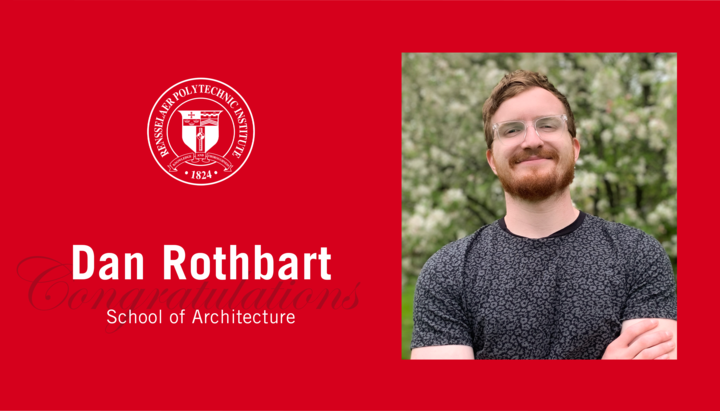Dan Rothbart, an architecture major, choose to attend Rensselaer after an open house toward the end of his college search. “I think I felt a strong connection to the campus, the city of Troy, and the School of Architecture,” he explained.
He has been immersed in completing his thesis, but during his time here has held part-time roles at the Center for Architecture Science and Ecology (CASE), Falling Anvil Studios, and Archi-Tectonics. At CASE, he will continue in his part-time research position over the summer working with social media and website management; at Falling Anvil Studios, he is a member of the design team and is hoping that a large project will be starting soon.
But it is Archi-Tectonics where he’s spent the most time, working full-time during summers and part-time during the school year, and is the source of his thesis research. Rothbart said his thesis began as an “investigation into architecture’s relationship to technology in a forward-looking society.” When Michael Oatman, associate professor in the School of Architecture, joined a design team doing a retrofit of a former IBM research and manufacturing center in Kingston, New York, Rothbart was invited to site his architectural thesis there.
“It was a perfect match,” he said, “because my original ambition was to take on a lot of the design challenges of the client’s real-world goals, and offer a potential solution via my architectural thesis, one that not only solved some of these problems in an economical way, but brought much more to the project through meaning and provocative design.”
It became necessary, however, to refocus his thesis to look at broader questions for the discipline of architecture. He began looking at the “what if” scenario: “What if a large corporation designs the renovation? What if they misinterpret the site’s history, and contemporary Kingston’s real wants or needs? What if their promises for a future society are one thing on paper, and another in objective reality?”
Now Rothbart is looking forward to returning full-time to Archi-Tectonics as a member of the design team to address some of these questions.
In addition to course work and working part-time, Rothbart took advantage of the study abroad program to spend a semester in Latin America. “Looking back on the day I found out about going abroad, it really feels like the beginning of a transformational period of learning, growing, and having fun with a great group of people that are very important to me now.” One of his favorite memories about Rensselaer, he says, was being able to approach the academic and personal opportunity without fear. “I allowed myself to learn as much as I could about people, ways of thinking, ways of living, ways of making, and more, mostly firsthand and for myself. These are things that will stick with me for a long time.”
He’s also learned, during the pandemic, that if his generation can engage with influential people within their chosen fields more easily, a large gap might be bridged between those seeking knowledge and those who have it.

